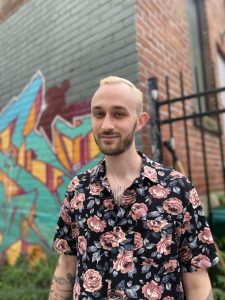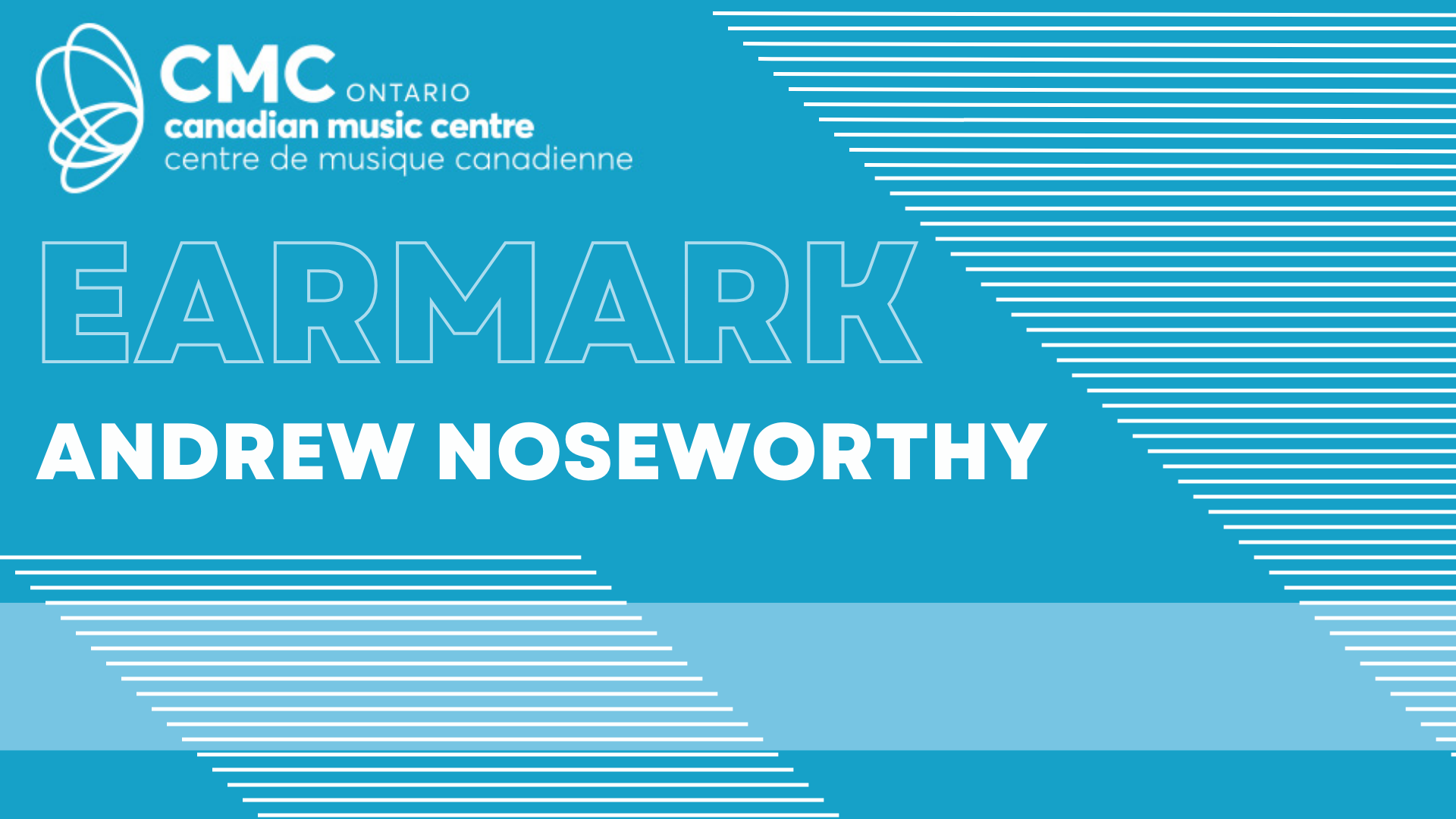In this instalment of Earmark, we catch up with Associate Composer Andrew Noseworthy about finding music in an isolated community, DIY aesthetics, listening broadly, and remaining true to your values.

What are your plans as we ease out of the pandemic? How has your form of artistic practice changed (if it has at all)?
I’ve had a number of discussions on this topic dating back to the initial lockdowns but to sum it up, the necessary switch to virtual productions/collaborations that many organizations had to adopt were already a part of my creative life, as well as other artists who have been in similar situations as myself. Virtual music making, learning, collaborating and dissemination have been ingrained in my work from the start, as I grew up in a fairly isolated location (Labrador West, NL) with little access to extensive music lessons, live music of classical or experimental natures, wider collaborative networks, etc. Much of my non-mainstream musical discoveries while growing up happened by going down internet search engine rabbit holes. My first formal guitar lessons were not until I was 18, after playing already for 6-7 years, and facilitated by a Memorial University distance learning via videoconferencing pilot program for prospective students. Since leaving Labrador and throughout living in St John’s (NL) or NYC or London (ON) over the years, virtual music making has continued to be a part of my practice through a number of collaborations or educational initiatives. When the pandemic hit, it meant I could develop my skills in this area further and also aid those with no experience in the area and who were struggling with these new adjustments, such as my bandmates in ContaQt. Even though I’m back to working in many in-person scenarios, distanced creative work still makes up at least half of what I do as an artist. I teach about 10 online students a week, participate in other virtual educational offerings, rehearse and perform online (and in-person) with ContaQt and the newly formed Backlined Collective, run a virtual label and collaborate with my extended network in NYC and elsewhere, etc. Technology and distanced music making can definitely create barriers for folks, especially financially, but it’s also a necessity for certain creatives.
What got you excited about music at a young age?
Most of my immediate family growing up were not musicians, professional or “amateur,” but they were all avid listeners who always had music playing somewhere at all times. My grandparents played country records, my dad’s transport truck tape deck was filled with classic rock, my mother would play 80s pop/new wave/RnB, and my uncle would put on live Kiss videos. Even before I started playing guitar around age 12, I was constantly consuming music, hearing music back in my head, or tapping away on surfaces, despite not becoming a drummer! Once I started learning to play guitar and eventually write music, I quickly moved through phases of being into classic heavy metal then more extreme metal, synthpop, hardcore punk, progressive rock and hip hop; all along with the variety of subgenres that come with each style. I had nearly no exposure to classical music when I was young, but like so many rock/metal kids turned composers/new music enthusiasts, I discovered Stravinsky, Mussorgsky, Glass, Webern, Crumb, Cage, etc. around 17 and instantly heard analogs between them and the other progressive and experimental I was listening to. Everything was blown wide open from there, so to speak.
What is an important music concert/event you attended?
There are too many to name at this point I think and all for different reasons. I’ve experienced many inspirational concerts and events, from attending metal and progressive rock shows while on vacation with my dad as a teenager, to later as an adult experiencing some pieces of contemporary music which I thought I might never experience in a live concert setting. The most important recent event though, was participating in the 2nd edition of the FIGEC festival in Valparaiso, Chile. This festival is completely dedicated to the electric guitar in contemporary music. As someone working within that very niche area, it was an incredibly validating, fulfilling, and life changing experience to play and present there, as well as working with the students and other professional players attending.
What have you been listening to lately? Does any of this make its way into your music?
Everything I listen to easily finds its way into my work somehow, even on the smallest or an imperceptible level. This is always a hard question to answer though, as I regularly listen to a pretty vast range and amount of music on a regular basis. Maybe to give an idea of that, I’ll include here a list of some of my favourite releases of 2023, some of my recent spins, all combined with some records that never leave my (actual) turntable:
- Lil Yachty – “Let’s Start Here”
- Nourished by Time – “Erotic Probiotic 2”
- Sleep Token – “Take Me Back to Eden”
- Hannah Jadagu – “aperture”
- Kali Uchi – “Red Moon in Venus”
- The Acacia Strain – “Failure Will Follow”
- Postcommodity and Alex Waterman – “In memoriam… Mary Cecil, Victoria Callihoo (Née Belcourt) and Eleanor (Helene) Thomas Garneau”
- Peter Cetera – “Solitude / Solitaire”
- Claudio Simonetti – “Demons” original soundtrack
- Tokyo String Quartet – “Bartok 6 String Quartets”
- The Pointer Sisters – “Special Things”
- Blue Gene Tyranny – “Degrees of Freedom Found”
- Massa Nera – “Derramar | Querer | Borrar”
- Bilal Nasser – “Where the Orange Groves Grow”
- Glenn Branca – “Symphony No. 1”
- etc etc…to name a few.
What is a significant insight that a mentor shared with you that has guided your practice?
Each of my main mentors throughout academia: Andrew Staniland, Michael Gordon and Paul Frehner, have shared consistent insight and inspiration that I’ve continued to hold close. This is also just limiting it to teachers during degrees, when there’s been a number of folks such as Paul Bendsza, Ellen Waterman and Blue Gene Tyranny, who I’ve also considered mentors while not being private teachers or academic advisors. I’ll perhaps just list a quick thing per composition teacher here. Andrew Staniland has always been helpful in providing sources of inspiration and encouraging me to stick to what I believe in. Michael Gordon showed me ways to think beyond barriers of what I thought was possible within my music. Paul Frehner helped me formulate and communicate my seemingly frantic ideas in the clearest and most direct way.
What is the most important lesson you would share with your younger self in regards to your music?
I actually used a version of this answer on a recent panel at the CMC! Because of my musical interests combined with the lack of resources growing up, pre-composer me was very “DIY or bust” with everything I did artistically. When I decided I wanted to move into the contemporary classical world and study music at the university level, I briefly had the idea that my work would become more formalized and my music would fit into these new structures that were not very DIY. If anything, it was an attempt to find a sort of external marker of legitimacy for my creative interests. In the end, my work just ended up operating in the same DIY way but in a different realm. I was still interested in the same kind of values and drawn to the same kinds of collaborators. So while many things have changed about myself and my music since then, I would tell my younger self that those core values might not actually change. One only finds a stronger way to define, explain and support them.
Tell me about a project/work of yours that you are particularly proud of.
The projects I am most proud of all involve recent releases by a community-driven label I co-run, People Places Records. Over the last couple of years, we’ve been able to release debut albums by many of my ongoing collaborators. The scope for these projects were all quite ambitious, and they all and come from a collaborative and post-genre place. Working on these albums helped me to continue my development from the lens of a multidisciplinary artist, as with each album I was not only involved with the release but also the performance, composition and production, all while supporting and uplifting the main artist involved. Two of those I can share are “longing for _” by Yang Chen and “AmethYst” by Yaz Lancaster:

